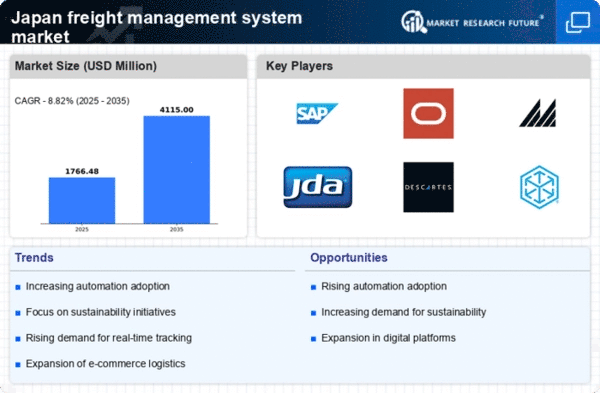E-commerce Growth
The rapid expansion of e-commerce in Japan is a pivotal driver for the freight management-system market. As online shopping continues to gain traction, logistics and freight services must adapt to meet the increasing demand for efficient delivery solutions. In 2025, e-commerce sales in Japan are projected to reach approximately ¥20 trillion, indicating a substantial market opportunity for freight management systems. This growth necessitates advanced logistics solutions that can handle the complexities of last-mile delivery, inventory management, and real-time tracking. Consequently, companies are increasingly investing in freight management systems to streamline operations and enhance customer satisfaction. The integration of these systems allows businesses to optimize routes, reduce delivery times, and manage costs effectively, thereby positioning themselves competitively in the evolving e-commerce landscape.
Regulatory Compliance
Regulatory compliance is an essential driver for the freight management-system market in Japan. The logistics sector is subject to various regulations aimed at ensuring safety, environmental sustainability, and fair competition. As regulations evolve, companies must adapt their operations to remain compliant, which often necessitates the implementation of sophisticated freight management systems. For instance, new regulations regarding emissions and vehicle standards require logistics providers to monitor and report their environmental impact. This compliance can be facilitated through advanced freight management systems that offer tracking and reporting capabilities. As businesses strive to meet regulatory requirements, the demand for these systems is likely to increase, thereby propelling growth in the freight management-system market.
Infrastructure Development
Infrastructure development in Japan is a significant driver for the freight management-system market. The government has been investing heavily in transportation infrastructure, including roads, railways, and ports, to enhance logistics efficiency. In 2025, the Japanese government plans to allocate approximately ¥5 trillion towards infrastructure projects aimed at improving connectivity and reducing congestion. This investment is expected to facilitate smoother freight operations and create a more conducive environment for the adoption of advanced freight management systems. Enhanced infrastructure not only reduces transit times but also lowers operational costs for logistics providers. As a result, the freight management-system market is likely to experience growth as companies seek to capitalize on improved infrastructure to optimize their supply chain operations.
Technological Advancements
Technological advancements play a crucial role in shaping the freight management-system market. Innovations such as artificial intelligence (AI), machine learning, and the Internet of Things (IoT) are transforming logistics operations in Japan. These technologies enable real-time data analysis, predictive analytics, and automated decision-making, which enhance operational efficiency. For instance, AI-driven algorithms can optimize routing and scheduling, potentially reducing transportation costs by up to 15%. Furthermore, the adoption of IoT devices allows for improved tracking of shipments, ensuring transparency and reliability in the supply chain. As companies increasingly recognize the benefits of these technologies, investment in freight management systems is likely to surge, driving market growth and fostering a more agile logistics environment.
Rising Consumer Expectations
Rising consumer expectations are significantly influencing the freight management-system market. In Japan, customers demand faster delivery times, greater transparency, and enhanced service quality. This shift in consumer behavior compels logistics providers to adopt advanced freight management systems that can meet these heightened expectations. According to recent surveys, approximately 70% of consumers in Japan prioritize delivery speed and reliability when choosing a service provider. As a result, companies are compelled to invest in systems that facilitate real-time tracking, automated notifications, and efficient route planning. By leveraging these systems, businesses can improve customer satisfaction and loyalty, ultimately driving growth in the freight management-system market. The ability to respond swiftly to consumer demands is becoming a competitive differentiator in the logistics sector.
















